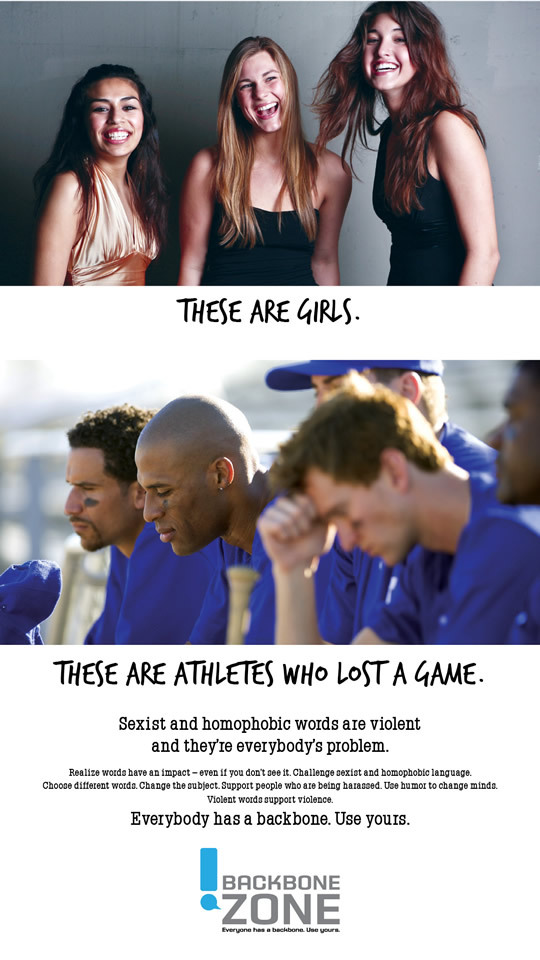Thursday, October 18, 2012
Backbone Zone ads
I love these ads, and I am really happy to see them up around campus, though I wish they were in more prominent places then the hallway to the bookstore and health and wellness... The use of the the word "violent" in these ads caught my attention ("Sexist and homophobic words are violent and they're everybody's problem") and made me think of Gender and Conflict. In the tiny print it also says "violent words support violence." I think my other favorite thing about these is the tag line of the campaign - "Everybody has a backbone. Use yours." I can't phrase exactly what I like about it, but it's something about the no-excuses phrasing.
All the posters are shown here on their website:http://www.mecasa.org/backbone/materials.html
Monday, October 15, 2012
On Angiers
On a whole I enjoyed these chapters. Particularly at the beginning of chapter 2, I found the break down of the XX and XY chromosome differences and such to be helpful, since biological science isn't exactly my arena. Although she did come across a little strong with her very pro-female perspective, she acknowledges that bias. While she doesn't shy away from it, she does state what is fact (or significant theory) and what are her own extrapolations.
The AIS woman was fascinating. Although I didn't fully comprehend all the nuances of what she was talking about, the information I could hold on to was pretty much brand new and quite interesting. I like learning about deviations from the standard gender binary; I know there are a lot more than I know and certainly a lot more than we as a culture are aware of. I would like to see if there is any data on a person with AIS who does not identify as a woman. Angiers stated that the majority of people are very comfortable as women, but I would be curious.
Near the end of chapter two is when she started losing me a little. Not out of disrespect for her argument, but the language got a little flowery for me. I did really like the ideas and points she was making; I guess it was only a minor set back. I found it to be besides the point? I don't know exactly what was off about it. Maybe just with so many articles with an extremely academic voice, the almost-prose was surprising. I will have to think about it.
The AIS woman was fascinating. Although I didn't fully comprehend all the nuances of what she was talking about, the information I could hold on to was pretty much brand new and quite interesting. I like learning about deviations from the standard gender binary; I know there are a lot more than I know and certainly a lot more than we as a culture are aware of. I would like to see if there is any data on a person with AIS who does not identify as a woman. Angiers stated that the majority of people are very comfortable as women, but I would be curious.
Near the end of chapter two is when she started losing me a little. Not out of disrespect for her argument, but the language got a little flowery for me. I did really like the ideas and points she was making; I guess it was only a minor set back. I found it to be besides the point? I don't know exactly what was off about it. Maybe just with so many articles with an extremely academic voice, the almost-prose was surprising. I will have to think about it.
Tuesday, October 2, 2012
Multicultural, Global and Postcolonial Feminism
Well I enjoyed this chapter much more than the one on Psychoanalytical feminism. I agree with this perspective more and many points that Multicultural etc. feminists focus on really make sense to me. The flaws they point out in other feminist perspective, primarily liberal feminism, are things that also bug me. Like the "women as sisters" thing, which never really settles well with me. You don't have to like and identify with all women in order to want equality.
Something else the mention here is "female chauvinism" - when one woman or group of women presumes to speak for all women around the world. This particularly happens in the Western world with privileged women - white, middle-class, heterosexual and/or well-educated. As a woman who fits into most of these categories, this particular issue is very relevant to me. The last thing I want is to assume to know anybody else's life story and what it is like to live their life. But one quote really stuck with me when talking about global feminist theory (part of a larger quote from Charlotte Bunch): "For women in industrialized countries, this connectedness [among women activists around the world] must be based in the authenticity of our struggles at home, in our need to learn from others, and in our efforts to understand the global implications of our actions, not in liberal guilt, condescending charity, or the false imposition of our models on others." (pg. 216-217, emphasis mine)
There is much more I could talk about in the chapter, but it is a lot to cover. I think I will leave it at this snippet for now. On a completely different note, I also found what I learned about Postmodern/3rd Wave feminism in class today to be very relevant to me. Personally, I like the idea of ditching the gender binary, even though that is pretty much an impractical idea. If we would stop focusing so much on gender, we could value individuals for their own merit, instead of what model they are supposed to fit into. But maybe that's just me.
-Sara
Something else the mention here is "female chauvinism" - when one woman or group of women presumes to speak for all women around the world. This particularly happens in the Western world with privileged women - white, middle-class, heterosexual and/or well-educated. As a woman who fits into most of these categories, this particular issue is very relevant to me. The last thing I want is to assume to know anybody else's life story and what it is like to live their life. But one quote really stuck with me when talking about global feminist theory (part of a larger quote from Charlotte Bunch): "For women in industrialized countries, this connectedness [among women activists around the world] must be based in the authenticity of our struggles at home, in our need to learn from others, and in our efforts to understand the global implications of our actions, not in liberal guilt, condescending charity, or the false imposition of our models on others." (pg. 216-217, emphasis mine)
There is much more I could talk about in the chapter, but it is a lot to cover. I think I will leave it at this snippet for now. On a completely different note, I also found what I learned about Postmodern/3rd Wave feminism in class today to be very relevant to me. Personally, I like the idea of ditching the gender binary, even though that is pretty much an impractical idea. If we would stop focusing so much on gender, we could value individuals for their own merit, instead of what model they are supposed to fit into. But maybe that's just me.
-Sara
Subscribe to:
Comments (Atom)

